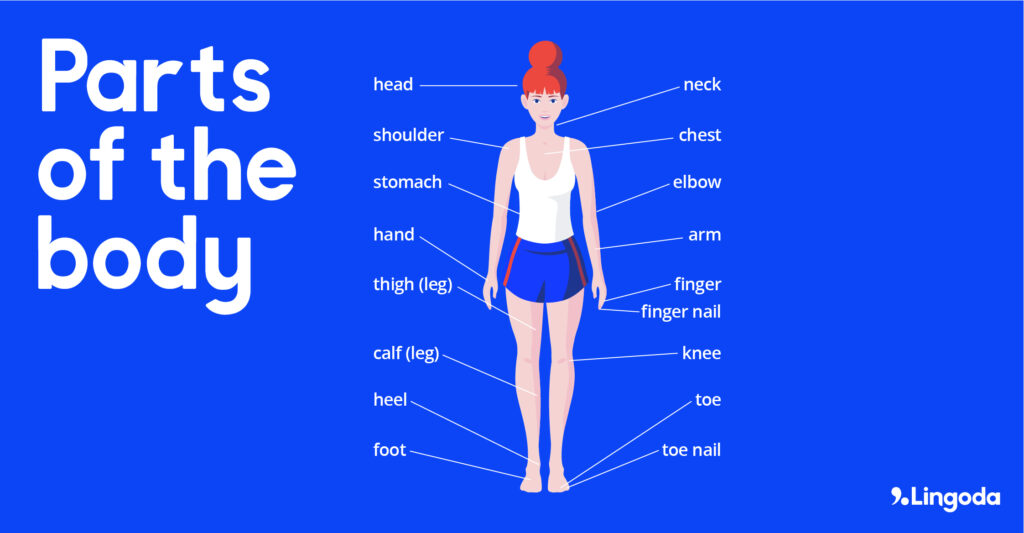Updated on October 15, 2024

Useful English vocabulary for going to the doctor (with body parts, symptoms and illness names)

No one wants to be in a scenario where they are living or travelling abroad and need to go to the doctor, but can’t speak the language. Fortunately, much of the medical world happens in English, so if you can speak English, this not only works for going to the doctor in English-speaking countries, but also in many other countries as well. In order to upgrade your English health vocabulary, here are the top words and phrases you might need to use for your next visit to the doctor.



In case you need to visit a doctor or need to go to the hospital, the below sections outline a wide variety of health-related vocabulary.
Quick note: If you’re in Germany or the EU, we’ve outlined the steps you need to take to make an emergency call here.
You can find an overview of all the names of the body parts in the image below:

The below table provides an overview of words and phrases related to injuries:
| Word or Phrase | Definition |
| injury | A general term of any physical impairment |
| pain/sore/ache | General terms for physical discomfort |
| bruise | A black and blue spot that develops after an injury |
| cut/wound/scratch | A skin opening that occurs after an injury |
| broken (body part) | When bone is broken such as a broken leg |
| sprained (body part) | When a muscle is sprained such as a sprained ankle |
| bite | When something bites you such as an insect or animal |
This table gives you an overview of terms related to illnesses:
| Word or Phrase | Definition |
| ill/sick | A general feeling of discomfort within the body |
| vomit | Discharge of stomach contents via the mouth |
| fever | A body temperature above the normal temperature |
| sore throat | Painful feeling in the throat |
| swelling | When a body part is abnormally enlarged |
| blood pressure | The rate that blood flows through the body |
| pulse | The consistency in beats at which blood flows through the body |
| chills | When you feel cold in an abnormal context |
| upset stomach | A general feeling of discomfort in your stomach |
| difficulty/trouble breathing | When you have problems to breath normally |
| faint/pass out | When you lose consciousness for a short period of time |
| Runny nose | When excessive internal fluids come through the nostrils |
Here are some names of common illnesses and diseases:
| Word or Phrase | Definition |
| cold | Common symptoms are coughing, a sore throat, and runny nose |
| flu | Common symptoms are a fever, muscle aches, and congestion (more serious than a cold) |
| headache | When a part of your head hurts |
| pneumonia | When flu symptoms persist intro a stronger form |
| rash | A group of spots on the skin that develops as a reaction to something |
| infection | When bacteria or viruses enter and attack the body that aren’t normally there |
| inflammation | The swelling or enlargement of a certain area |
| heart attack | When the heart ceases to function due to a blood clot |
| indigestion | Trouble with digesting something |
| ulcer | When the normal functionality of an organ is somehow disrupted |
| asthma | Difficulty breathing on a permanent or semi-permanent basis |
| stroke | When blood supply to the brain is reduced, interrupted or stopped |
| arthritis | Difficulty to move certain muscles or joints |
| diabetes | When people have too much sugar (glucose) in their blood |
| cancer | When the body’s cells begin to abnormally divide and spread |
| amnesia | When a patient has trouble remembering things |
| allergies | When you can’t eat or touch a certain item such as a nut allergy |
The below table describes different terms used for medicine, healing, and a few common types of medical procedures:
| Word or Phrase | Definition |
| patient | Anyone who visits the doctor |
| pills/tablets | Medicine that is swallowed in the form of a circle or oblong shape |
| medicine | Any type of substance or material intended to heal a patient |
| cure | A type of medicine or action that stops an illness or injury |
| bandage | The wrapping that goes around a wound |
| injection | Medicine given within the bloodstream through a needle |
| antiseptic | A substance used to kill bacteria in the surrounding area |
| cast | The strong material that holds bones in place such as what you wear after breaking your leg |
| crutches | The supports you use to walk after an injury |
| thermometer | An instrument that takes your body temperature |
| stethoscope | An instrument used to listen to your heart beat |
| x-ray | An instrument that takes images of the internal bodily structure |
| antibiotics | Medication that’s given to kill bacterial infections |
| surgery/operation | A procedure that involves making internal improvements to the body in some manner |
This table outlines the official names of different types of doctors and which medical field they specialise in:
| Type of Doctor | What they specialise in |
| Nurse | The person who supports the doctors and takes care of patients |
| Allergist | A doctor who specialises in allergies |
| Anesthesiologist | A doctor who administers anesthesia |
| Dentist | A doctor who focuses on teeth and oral health |
| Dermatologist | A doctor who specialises in skin |
| Gynecologist | A doctor who specialises in female reproductive health |
| Midwife | A doctor who helps deliver babies |
| Neurologist | A doctor who specialises in the brain and neurosystems |
| Oncologist | A doctor who specialises in cancer and tumors |
| Pediatrician | A doctor who works with children |
| Physical Therapist | A doctor who improves the muscles and body movement |
| Psychiatrist | A doctor who specialises in mental health |
We hope you won’t need to use this health related vocabulary very often, but we hope when you do, it’s helpful!


